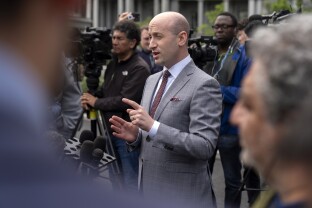White House Deputy Chief of Staff Stephen Miller said Friday that the administration is looking into suspending habeas corpus, potentially eliminating a path for immigrants to challenge their detention.
“The Constitution is clear — and that of course is the supreme law of the land — that the privilege of the writ of habeas corpus can be suspended in a time of an invasion,” Miller told reporters outside the White House. “So I would say that’s an option we’re actively looking at. A lot of this depends on whether the courts do the right thing or not.”
The right to habeas corpus is spelled out in Article I of the U.S. Constitution, with limited exceptions for it to be suspended “when in Cases of Rebellion or Invasion the public Safety may require it.” Presidents have rarely made broad suspensions — the most sweeping example is when Abraham Lincoln suspended habeas corpus during the Civil War.
Courts have affirmed that habeas corpus applies not just to U.S. citizens, but also immigrants and foreign detainees. That extended to detainees at Guantanamo Bay in a 2008 Supreme Court ruling — though current justices John Roberts, Samuel Alito and Clarence Thomas were all in dissent.
But the Trump administration has suggested that the need to block unauthorized immigration should outweigh these concerns. President Donald Trump declared the Venezuelan gang Tren de Aragua an invading force under the Alien Enemies Act of 1798 in order to skip over typical deportation proceedings that allow migrants to argue they should get relief to remain in the U.S.
In a memo declassified on Monday, however, U.S. intelligence agencies disagreed with the Trump administration’s assertion that Venezuela’s President Nicolás Maduro collaborates with or controls Tren de Aragua — a key factor for designating it an invading force.
Multiple judges have blocked removals under the Alien Enemies Act, and the Supreme Court ordered that Venezuelans detained under the law can submit habeas petitions.
However, NOTUS previously reported that while prisoners across the country prepare and file their own petitions, it’s unlikely that Trump’s detainees are in a position to properly advocate for themselves in this manner.
“It would be virtually impossible for an abducted person to properly prepare a habeas petition on their own without a lawyer. Merely notifying someone that they have the right to file is meaningless unless you give that person access to counsel,” Matthew Stiegler, an appellate lawyer in Philadelphia and former prosecutor at the city’s district attorney’s office, told NOTUS in April.
D.C. Chief Judge James Boasberg suggested that the administration’s deportation efforts were set up in a way that intentionally limits prisoners’ ability to exercise their rights, particularly the administration’s March 15 deportation operation.
Trump recently said he was unsure whether non-citizens should receive due process.
“I don’t know,” Trump said on Sunday’s “Meet the Press.” “It seems — it might say that, but if you’re talking about that, then we’d have to have a million or 2 million or 3 million trials.”
Democratic Rep. Ritchie Torres condemned Miller’s comments on Friday.
“The President has no authority to suspend habeas corpus,” Torres wrote after sharing a clip of Miller’s comments. “The Suspension Clause is found in Article I of the U.S. Constitution. Article I defines the powers of Congress—not the President.”
—
Violet Jira is a NOTUS reporter and an Allbritton Journalism Institute fellow.
Sign in
Log into your free account with your email. Don’t have one?
Check your email for a one-time code.
We sent a 4-digit code to . Enter the pin to confirm your account.
New code will be available in 1:00
Let’s try this again.
We encountered an error with the passcode sent to . Please reenter your email.


